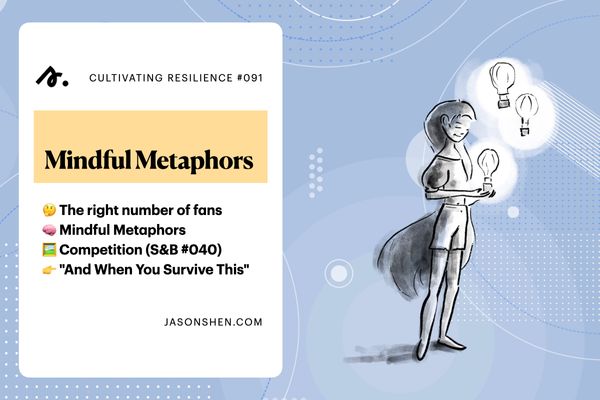🤔 The right number of fans
Do you want to be famous? If so, how many fans/people that admire your work would be your ideal number to have (ie the number of fans that you wouldn’t want to exceed)? Assume you get all the typical pros and cons that come with that level of fame. (This question shamelessly stolen from Spencer Greenberg)
- Millions of fans
- Tens of thousands of fans
- Hundreds of fans
- No fans / don't want fame
🧠 Mindful Metaphors
I'm thinking about metaphors. I'm actually reading a whole book about them, how metaphors shape our perception and thus our lives, and they came up in a recent coaching conversation.
Seeing yourself as a pillar to lean on is very different from being a partner to work with. Or as a tool to be used versus as a lens through which to focus. Or as phone call that needs to get picked up versus a star that shines light continuously.
The right metaphor can empower you while the wrong one can keep you feeling trapped. At Etsy, we had this idea of a "mindful metaphor" which meant trying not to use phrases like "she dropped a bomb in that meeting" or "let's swing for the fences" which imply violence or zero sum competition.
And people who always see the world that way are not fun to be around, as today's Scotch and Bean tells us. And while sports and military metaphors might never truly disappear because we love them too much, next time you find yourself reaching for one, try to pick something different.
Another kind of mindful metaphor I came across recently was a reframe on how mindfulness should feel: on having a dog mind or a lion mind.
If I’m standing in front of a dog and I wave the bone in the dog’s face side to side, and then toss the bone a few yards away, what will the dog do? “Chase the bone,” the group often yells back. But what if I’m standing in front of a lion. And I wave the bone in the lion’s face from side to side, and toss it a few yards away. What will the lion do? “Eat you!” is often the resounding response.
The fact is that the lion may eat me. The lion could eat me. But the there’s a fundamental difference between the mind of the dog and that of the lion. The dog has tunnel vision and can’t see beyond the bone. It becomes simple: If I control the bone, I control the dog’s reality.
Of course, it’s fundamentally different with the lion. The lion sits upright as I wave the bone, eyes looking beyond the bone and directly at me. The lion has poise, understands the bone is just a small piece of a larger reality, and therefore has much more autonomy. The lion can go after the bone, can sit there and stare at me, can eat me.
The goal of mindfulness is not necessarily to always be calm and relaxed. It's to be like the lion: in control of its attention and focused on what it wants to focus on, rather than just the bone.
Are there any metaphors that you've found helpful in your own life?
